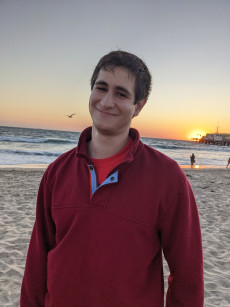Meet Yotam Yaniv, 2024 Berkeley Lab Grace Hopper Fellow
September 13, 2024
By Keri Troutman
Contact: cscomms@lbl.gov
Yotam Yaniv, Berkeley Lab’s newest Grace Hopper Fellow, leaned into his strength as a mathematician at a young age. After moving to the U.S. from Israel as a young child, he found comfort in the “universal language” of mathematics, and his proficiency in the subject helped him navigate the challenges of being an immigrant. A promising young researcher whose passion for mathematics and computer science has led him to research projects in computational efficiency and machine learning throughout his educational experience, Yaniv is excited to take the next step at Berkeley Lab in the Machine Learning and Analytics Group within the Scientific Data Division.
His research will be focused on the development of randomized numerical linear algebra methods, aiming to develop faster, more efficient, and sustainable algorithms that can significantly reduce computational energy consumption, especially at scale. The vision for "greener algorithms" aligns with Yaniv’s desire to contribute to the global fight against climate change.
"The thing that interests me the most is using tools from probability to speed up algorithms," said Yaniv. “[And] if we can make algorithms more efficient, then we can save on computing power. Think about something as simple as a Google search—if we could reduce the amount of energy used, even by a small amount, it would compound over time with millions of people searching every day."
Yaniv’s journey into academia began as a math major at the University of Maryland. He had always been strong in math, and this strength eventually led him to add computer science to his repertoire, combining both fields to explore computational methods that have real-world applications. He would go on to complete his PhD at UCLA with a focus on theoretical concepts.
His first exposure to Berkeley Lab was during a graduate internship through the National Science Foundation’s Mathematical Sciences program. This experience set the stage for his future collaborations with key Berkeley Lab researchers like Sherry Li in the Scalable Solvers Group and Michael Mahoney, who also works on randomized numerical linear algebra and leads the Machine Learning and Analytics group. Yaniv is excited to work closely with them while contributing to the broader scientific community at Berkeley Lab. He appreciates the impact the lab is making and feels honored to be a part of it: "The people here are incredible, and the work they’re doing has a real, tangible impact on the world."
Aside from research, Yaniv enjoys maintaining an active lifestyle, having recently taken up triathlon training. "I got into running with some grad school friends last year. I'm not fast, but I'm consistent with running, biking, and swimming."
The Berkeley Lab’s Admiral Grace Hopper Fellowship was established in 2015 with the goal of developing early-career computational scientists to make outstanding contributions in the area of HPC applications.
About Berkeley Lab
Founded in 1931 on the belief that the biggest scientific challenges are best addressed by teams, Lawrence Berkeley National Laboratory and its scientists have been recognized with 16 Nobel Prizes. Today, Berkeley Lab researchers develop sustainable energy and environmental solutions, create useful new materials, advance the frontiers of computing, and probe the mysteries of life, matter, and the universe. Scientists from around the world rely on the Lab’s facilities for their own discovery science. Berkeley Lab is a multiprogram national laboratory, managed by the University of California for the U.S. Department of Energy’s Office of Science.
DOE’s Office of Science is the single largest supporter of basic research in the physical sciences in the United States, and is working to address some of the most pressing challenges of our time. For more information, please visit energy.gov/science.










